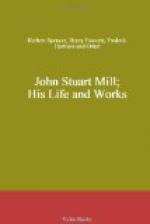and Discussions” was an article that appeared
in “The Jurist,” in 1833, entitled “Corporation
and Church Property.” That essay, in some
respects, curiously anticipated the Irish Church legislation
of nearly forty years later. In the same year
he published, in “The Monthly Repository,”
a remarkably able and quite a different production,—“Poetry
and its Varieties,” showing that in the department
of belles-lettres he could write with nearly
as much vigor and originality as in the philosophical
and political departments of thought to which, ostensibly,
he was especially devoted. Shortly after that
he embarked in a bolder literary venture. Differences
having arisen concerning “The Westminster Review,”
a new quarterly journal—“The London
Review”—was begun by Sir William
Molesworth, with Mr. Mill for editor, in 1835.
“The London” was next year amalgamated
with “The Westminster,” and then the nominal
if not the actual editorship passed into the hands
of Mr. John Robertson. Mr. Mill continued, however,
to be one of its most constant and able contributors
until the Review passed into other hands in 1840.
He aided much to make and maintain its reputation
as the leading organ of bold thought on religious
and social as well as political matters. Besides
such remarkable essays as those on Civilization, on
Armand Carrel, on Alfred de Vigny, on Bentham, and
on Coleridge, which, with others, have been republished
in his collection of minor writings, he contributed
many of great importance. One on Mr. Tennyson,
which was published in 1835, is especially noteworthy.
Others referred more especially to the politics of
the day. From one, which appeared in 1837, reviewing
Albany Fonblanque’s “England under Seven
Administrations,” and speaking generally in high
terms of the politics of “The Examiner,”
we may extract a few sentences which define very clearly
the political ground taken by Mr. Mill, Mr. Fonblanque,
and those who had then come to be called Philosophical
Radicals. “There are divers schools of Radicals,”
said Mr. Mill. “There are the historical
Radicals, who demand popular institutions as the inheritance
of Englishmen, transmitted to us from the Saxons or
the barons of Runnymede. There are the metaphysical
Radicals, who hold the principles of democracy, not
as means to good government, but as corollaries from
some unreal abstraction,—from ‘natural
liberty’ or ‘natural rights.’
There are the radicals of occasion and circumstance,
who are radicals because they disapprove the measures
of the government for the time being. There are,
lastly, the Radicals of position, who are Radicals,
as somebody said, because they are not lords.
Those whom, in contradistinction to all these, we call
Philosophical Radicals, are those who in politics observe
the common manner of philosophers; that is, who, when
they are discussing means, begin by considering the
end, and, when they desire to produce effects, think
of causes. These persons became Radicals because




